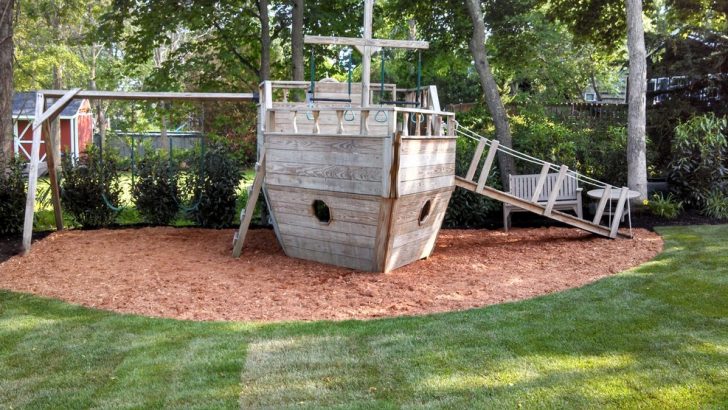For a child, the most magical part of their home is not the house itself, but the garden. Gardens twitter and hum with life. They are full of mysterious bugs, birds, frogs and sundry slimy things. Bushes and undergrowth become secret dens, where adults may not tread. The lawn is for football and games of chase, while trees are for climbing, and rope swings. In the garden, in the fresh air, under the open sky, the vibrancy of nature seeps into children’s bones.
For small children, their gardens are quite unlike public outdoor spaces, where they may at any moment be confronted by a barking dog, unfriendly children, or strangers. The garden is their domain. It is a minor wilderness, but on their preferred scale – small, natural yet perfectly safe.
We were fortunate enough to find a house with a beautifully planted and spacious garden full of mature trees, shrubs, flowers, hedges and exotic and interesting plants. According to the children, they have twelve dens – four of which are secret – and seven climbing trees. We have also added in quite a few play items, including a large two-storey playhouse, two small playhouses, three swings, as well as a see-saw and two slides. That is before we even get to Willow Nest, the three-storey tree house which the kids and I constructed last summer. There’s also a football goal, a trampoline and approximately one thousand other bits and bobs, which I must clear from the lawn before cutting the grass.
Paradise
Turning your garden into a kids’ paradise is a parenting masterstroke. It benefits the parents as much as the children. Instead of being indoors, under your feet, they are out in the garden running around, getting exercise and generally not bothering you. Having exercised and having been immersed in nature for hours, they come back in calmer and happier. They develop a hearty appetite, and drop off to sleep rapidly. Their fitness level increases, as does their co-ordination and skills at climbing, balance, throwing and jumping. Addictive screens and gaming machines seem paltry, compared to the three dimension experience of such reality. I look out the window to surprising scenes: My three-year-old flying past in the wheelbarrow, laughing as her big brother pushes her along. Or perhaps they’ve randomly constructed a wigwam from old bamboo canes.
They are within parental earshot, in case of an emergency, but they are essentially playing on their own. This means they create their own imaginary games: one hour they are running a farm, or a shop, the next they are being chased by dragons. Their emotional intelligence improves, because they must negotiate their roles in these games and resolve any disputes which arise. The older kids manage the smaller kids, and the smaller kids learn and thrive when learning big kid games. One of the criticisms of helicopter parenting, where parents are forever micromanaging their kids play, is that kids never get to develop such skills, because adults resolve and manage all such disputes.
Some may say, this is excessive: all we had when I was a kid was a sand pit. They forget that back then we also had the freedom to roam around the neighbourhood from a young age, to find the best climbing trees and dens, or to go to the park to play on the swings, slides and climbing frames.
For better or worse, society has now taken such freedom from children and so we have a duty to provide kids with the things where they remain free to roam: within their gardens.
We had some kids over for a play date after school yesterday. They all disappeared into the garden and for a few hours I heard various whoops of delight in the distance. All I had to do to provide a full afternoon of child entertainment was this: open the back door.


 Rory Fitzgerald
Rory Fitzgerald